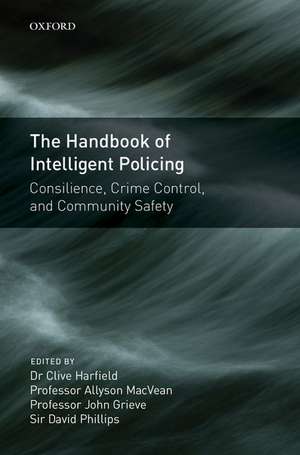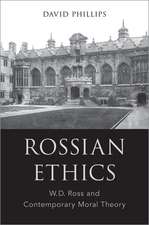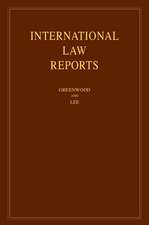Handbook of Intelligent Policing: Consilience, Crime Control, and Community Safety
Clive Harfield, John Grieve, Allyson MacVean, David Phillipsen Limba Engleză Paperback – 28 aug 2008
Preț: 300.62 lei
Preț vechi: 386.07 lei
-22% Nou
Puncte Express: 451
Preț estimativ în valută:
57.52€ • 60.06$ • 47.61£
57.52€ • 60.06$ • 47.61£
Carte tipărită la comandă
Livrare economică 24-31 martie
Preluare comenzi: 021 569.72.76
Specificații
ISBN-13: 9780199533121
ISBN-10: 0199533121
Pagini: 340
Ilustrații: 1
Dimensiuni: 156 x 234 x 21 mm
Greutate: 0.48 kg
Ediția:New.
Editura: OUP OXFORD
Colecția OUP Oxford
Locul publicării:Oxford, United Kingdom
ISBN-10: 0199533121
Pagini: 340
Ilustrații: 1
Dimensiuni: 156 x 234 x 21 mm
Greutate: 0.48 kg
Ediția:New.
Editura: OUP OXFORD
Colecția OUP Oxford
Locul publicării:Oxford, United Kingdom
Notă biografică
Professor John Grieve QPM is Professor Emeritus and Chair of the John Grieve Centre for Policing at London Metropolitan University, and a former Director of Intelligence for the Metropolitan Police.Professor Allyson McVean is Director and Founder of the John Grieve Centre for Policing and Community Safety, London Metropolitan University. She has extensive practical experience of working with police forces on issues of dangerous offender management and community impact assessments, and thus brings a third party perspective to the partnership use of intelligence. Dr Clive Harfield is Deputy Director of the John Grieve Centre for Policing and Community Safety and a police commander and national intelligence officer. Dr Harfield is co-author of two Blackstone's Practical Policing titles, Covert Investigation and Intelligence.Sir David Phillips is Director of the National Centre of Policing Excellence and former Chief Constable of Kent Police. He was knighted in 2000 for his services to policing and is an honorary fellow of Christ Church, University of Oxford. Sir David is best known for his development of 'intelligence led' policing, his contributions to criminal justice reform and his advocacy of professional skills in investigation. He was a member of the Criminal Justice Council by appointment of the Lord Chancellor.













